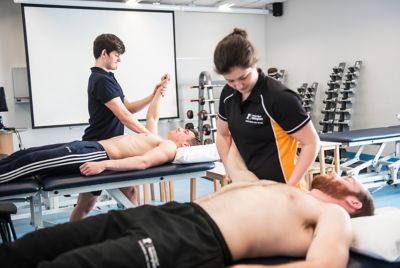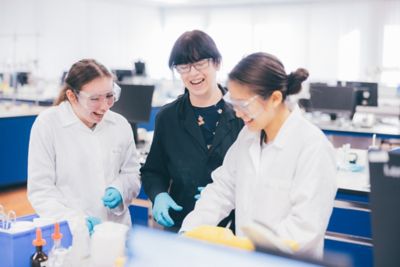*For full details including fees for part-time students and reduced fees during your time studying abroad or on placement (where applicable), see our fees page.
If you are a student from the EU, EEA or Switzerland, you may be asked to complete a fee status questionnaire and your answers will be assessed using guidance issued by the UK Council for International Student Affairs (UKCISA).
Additional costs
As a student on this course, you should factor some additional costs into your budget, alongside your tuition fees and living expenses. This includes around £30 for skeleton hire (please note skeleton hire is optional) and the costs of purchasing suitable sport clothing, such as trainers and swimwear, for practical sessions.
You are provided with a uniform to wear in practice placements however you may wish to purchase additional items.
You should be able to access most of the books needed through our libraries, though you may wish to purchase your own copies.
Travel to your placements is self-funded and costs will vary depending on location. However, you may be eligible to reimburse some of your travel and accommodation costs while on placement. Please note that these figures are approximate and subject to change.
Scholarships and bursaries
As an allied health student, you'll receive an additional payment of at least £5,000 a year of government funding, which you will not need to pay back. Full information can be found here.
Sports Scholarships
Full details of these can be found here.
Tuition fees 2025/26 (UK undergraduate students)
The UK Government is intending to increase the tuition fee cap for UK undergraduate and Initial Teacher Training students studying in England to £9,535 for the 2025/26 academic year. This is an increase of £285 per year. Course pages will be updated to reflect the latest tuition fees as more information becomes available. For more information, visit the Government’s website and take a look at our FAQs.
*For full details including fees for part-time students and reduced fees during your time studying abroad or on placement (where applicable), see our fees page.
If you are a student from the EU, EEA or Switzerland, you may be asked to complete a fee status questionnaire and your answers will be assessed using guidance issued by the UK Council for International Student Affairs (UKCISA).
Additional costs
As a student on this course, you should factor some additional costs into your budget, alongside your tuition fees and living expenses. This includes around £30 for skeleton hire (please note skeleton hire is optional) and the costs of purchasing suitable sport clothing, such as trainers and swimwear, for practical sessions.
You are provided with a uniform to wear in practice placements however you may wish to purchase additional items.
You should be able to access most of the books needed through our libraries, though you may wish to purchase your own copies.
Travel to your placements is self-funded and costs will vary depending on location. However, you may be eligible to reimburse some of your travel and accommodation costs while on placement. Please note that these figures are approximate and subject to change.
Scholarships and bursaries
As an allied health student, you'll receive an additional payment of at least £5,000 a year of government funding, which you will not need to pay back. Full information can be found here.
Home students*
Over one third of our UK students receive our means-tested core bursary, worth up to £1,000 a year. Full details can be found on our financial support pages.
* A 'home' student is one who meets certain UK residence criteria. These are the same criteria as apply to eligibility for home funding from Student Finance.
Sports Scholarships
Full details of these can be found here.





